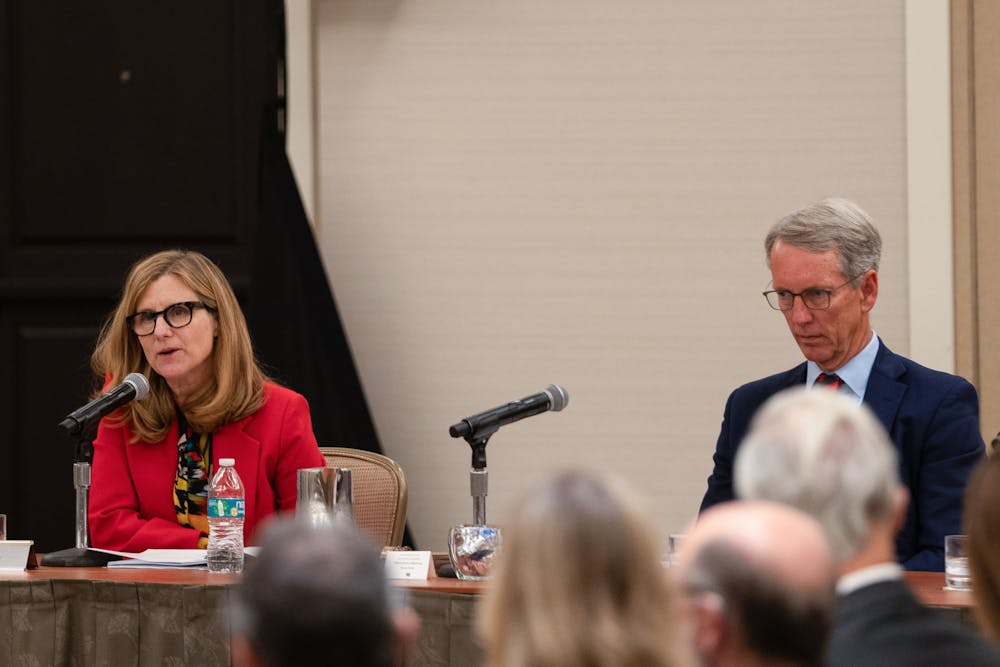Penn has recently made national headlines after President Liz Magill and Board of Trustees Chair Scott Bok resigned from their positions, having faced increasing scrutiny and allegations of complicity in campus antisemitism.
It’s a strangely poetic justice. Before nightfall and the conclusion of Shabbat on Dec. 9, as Penn’s Jews were preparing to light the fourth candle of the menorah, our university’s contentious administrative heads resigned. But do these resignations mark an actual change on our campus?
The earliest publicized call for Magill’s resignation was by Marc Rowan, CEO of Apollo Management and Wharton alumnus. He was also among the first of the university’s donors to retract funding, after whom many other donors followed suit. With the administration’s upheaval, Penn has garnered criticism for pandering to the interests of whoever benefits the university endowment.
While Magill and Bok have publicly become the faces of Penn’s antisemitism, longstanding cultural issues have brewed within the broader Penn community. For instance, a student has faced legal repercussions after allegedly stealing Israeli flags hung near campus. Currently, at least one other student is also awaiting hearings for charges of misdemeanor and theft. And so, the recent resignations are little more than a symbolic triumph over antisemitism on campus. It is unlikely that our university’s dynamic will actually change.
The President is only responsible for the university’s vision and strategy while the Board of Trustees oversees the president and institutional policies. In short, both parties rarely handle day-to-day disciplinary actions or even the selection of students and faculty. Additionally, they do not have much say over the scheduling of organized events — most notably the Palestine Writes Literature Festival and the screening of the controversial documentary “Israelism.”
Rather, we have the Provost, who oversees academic affairs and the hiring of faculty; deans, who manage the operations of specific schools or departments; the Faculty Senate, which represents the faculty’s interests in policy making; and the Office of Student Affairs, which handles student conduct and campus culture.
And with Penn’s structure of decentralized decision making, discipline and policy enforcement inadvertently lie in the hands of professors as well. However, Penn’s principle of academic freedom makes it difficult to, at least at an institutional level, reprimand these de facto administrators themselves with controversial speech. Nevertheless, the statute for freedom of speech does not absolve professors of their responsibility to uphold professional conduct. As our university’s structure is amidst an unprecedented turnover, we need to encourage constructive — rather than controversial — dialogue as well as opportunities for impressionable students to think critically. With these dynamics, some professors have been concerningly crass in their public commentary of the Israel-Hamas conflict.
As a student myself, I don’t want to discredit the authority or abilities of my instructors. However, our leadership needs to recognize that their speech can contribute to student discomfort and fear of open dialogue. I’m sure that most of Penn’s community not only accepts but actively seeks the exploration and debate of differing ideas. But when students and faculty cease to maintain mutual respect, the ethics of the academic community are ironically ignored.
SEE MORE FROM MRITIKA SENTHIL:
The Middle East Center Director’s resignation is a concerning echo of the Cold War
Shallow solidarity: How ignorance trivializes the Israel-Hamas conflict
It's clear that Magill and Bok are not solely responsible for what Penn has come to. Therefore, unless a comprehensive restructuring of campus standards is initiated, Magill and Bok’s resignations amount to little in terms of the campus environment.
MRITIKA SENTHIL is a first year studying Management and Russian & East European Studies from Columbia, South Carolina. Her email is mritikas@upenn.edu.









